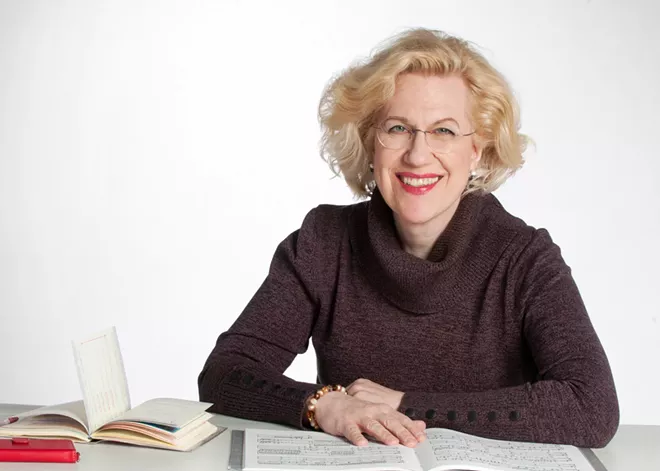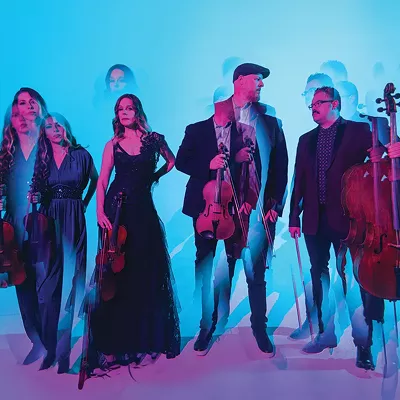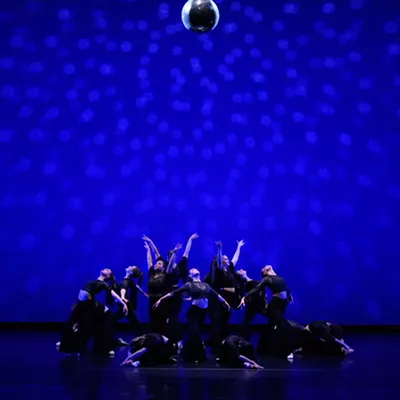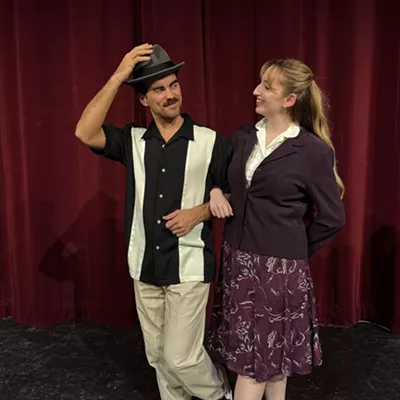The first time that pianist Sara Davis Buechner felt what she calls "the real spiritual power" of George Gershwin's music, she was 23 and building a reputation for virtuoso playing on the international concert circuit.
After one successful performance at a major piano competition, she was staying in Brussels with a host family, an older couple who had a habit of listening to the radio during dinner. One evening, the couple excitedly tuned in to a performance of Gershwin's Rhapsody in Blue.
"It was a Bulgarian pianist who was playing with the Belgian Radio Orchestra," Buechner recalls, and I thought, 'Well, gee, that'll be bizarre or terrible or something.' At that point in my life I had not really played a note of Gershwin. I had grown up with this kind of standard thinking that, you know, you're a classical pianist, you don't play Gershwin."
But when the piece burst into its fittingly rhapsodic conclusion, she started to cry "like crazy."
"I was blubbering. My friend came over and consoled me: 'What's the matter?' And I said, 'I'm so, so homesick.'"
That Gershwin's music could trigger such a profound longing for her native country and her then-hometown of New York might not seem so unusual. Woody Allen chose Rhapsody in Blue's fluttering, soaring clarinet intro to set the mood for the very first scenes and opening narration of his 1979 film Manhattan, and for decades United Airlines — much to Buechner's irritation — has used the piece to evoke a sense of jazzy, jet-setting dynamism in its advertisements and preflight videos.
"The genius was that he was able to distill in the music the sounds of the metropolis that he loved so much, a very American feeling. And from that moment, I dedicated a large part of myself to learning as much Gershwin as I could," Buechner says.
The very next year, she won the 1984 Gina Bachauer International Piano Competition with Gershwin's Piano Concerto in F.
"It was the first time anyone had ever played it in that competition. And it was also the last, because after I won the contest, they removed it from the repertoire list. There were people out there who thought that it was wrong to win a competition by not playing Beethoven or Rachmaninoff or something."
The prejudices of the classical music world, and indeed in all human endeavors, are unfortunately not lost on Buechner. Gershwin, whose music she has since championed through two albums and countless concert programs, is just one example. And perhaps a secondary one at that. More significantly, during Buechner's gender transition in the late 1990s, the heady upward trajectory that she had experienced as David Buechner quickly began to stall.
As she wrote in a 2015 piece titled "Transgender Today" in the New York Times, changing her outward appearance to mirror her inner self "came at heavy cost to a busy concert schedule that shrank to nothing, a New York conservatory position that was taken away, and a mantle of respect in the United States that vanished." She moved to Canada, where she found the personal freedom and professional acceptance that was not yet forthcoming in America.
Although broader changes in attitudes haven't nearly been as swift, comprehensive or sustained as she might hope, Buechner did return to the U.S. and set down roots in Philadelphia. Growing acceptance led to university faculty positions and performance opportunities as well as a new status as an LGBTQ+ spokesperson.
This weekend, amid a longer string of concert dates that will bring her to New York, the American Southwest and Japan, she performs Gershwin's Rhapsody in Blue with the Spokane Symphony under Morihiko Nakahara's baton. And she has a very strong mind regarding how it ought to be played.
"In the space of two weeks, [Gershwin] turned this out a couple of pages a day at his kitchen table. And the first part of the piece that he started to write down was right towards the end, this kind of stretto thing with furious repeated notes, which he took the rhythm from the sound of subway trains."
Then, Buchner explains, he added "a musical tribute to metropolitan madness, as he called it," which captured the emotional wallop of seeing "skyscrapers going up in Manhattan... zeppelins and biplanes, player pianos and the radio."
"You have to think of all those elements that Gershwin himself put into it as a composer. I mean, it's incredible genius. And it'll never happen again. It's like The Rite of Spring or The Beatles on Ed Sullivan. So when I talk about conveying that to an audience, well, I guess I'm mostly thinking about making sure that it's really exciting. It has to be played quickly."
Rhapsody in Blue is just one part of this Masterworks concert program that concentrates exclusively on the work of American composers, two of whom are still active. As a possible sign of the classical music community's increasing eagerness to challenge some of its lingering taboos, several pieces besides the Gershwin draw inspiration from jazz and beyond.
The "Celebration Overture" that kicks off the concert debuted as recently as 2022 and was composed by the orchestra's own Greg Yasinitsky, a contemporary saxophonist known for his work with Clark Terry, David Sanborn and the Jazz Education Network All Stars Big Band. Gabriela Lena Frank's "Concertino Cusqueño" weaves together an ancient Peruvian religious tune with a motif from Benjamin Britten's Violin Concerto.
Harking back to the last century, American masters like John Adams and Leonard Bernstein are represented through The Chairman Dances and Fancy Free, respectively.
The percussive Adams piece imagines People's Republic of China founder Mao Zedong and his wife dancing a foxtrot together. Fancy Free is a ballet that Bernstein co-created with choreographer Jerome Robbins about sailors on shore leave in New York City during World War II. The suite's prologue, "Big Stuff," was originally written for jazz legend Billie Holiday.
Nakahara says that the common thread among all five works is a unique incorporation of rhythm.
"Bernstein had a knack for writing catchy tunes. West Side Story is very indicative of that. But also he was very witty when it comes to rhythm. His music grooves in an interesting way," he says.
"But, really, the whole program showcases how inventive, appealing and diverse 'American classical music' is. Even though we sometimes tend to mentally separate popular music versus classical music, there's always some kind of connection between classical composers and the popular music and culture of their time, reaching back to Mozart and Brahms and so on, right? When we look at 20th-century and 21st-century American music, that's no exception." ♦
Masterworks 3: An American Celebration • Sat, Nov. 2 at 7:30 pm and Sun, Nov. 3 at 3 pm • $21-$72 • The Fox Theater • 1001 W. Sprague Ave. foxtheaterspokane.org • 509-624-1200






















